
A protester wrapped the Democracy Monument in a large Pride flag during a protest in August 2021. On top of the Monument is a red flag stating the three demands of the pro-democracy movement: resignational of Gen Prayut Chan-o-cha, a new constitution, and monarchy reform
The Covid-19 pandemic continued in 2021. Thailand remains in a state of emergency, which was declared in March 2020 and has yet to be lifted, and has been going in and out of lockdown.
Meanwhile, pro-democracy protesters continue to struggle against the status quo and call for monarchy and democratic reform despite violence from the authorities and legal prosecutions, while also taking to the streets and social media to call attention to other social issues, such as community rights, labour rights, and gender equality.
Let’s close the year by looking back at 2021 through 15 articles chosen by the Prachatai English editorial team.
2021 budget: expenses related to the monarchy from all agencies total 37 billion baht

Read the article here.
In late August 2020, the Budget Expenditures Bill 2021 passed to the committee stage. The Prachatai editorial team looked through all the budget documents to add up all the expenses relating to the monarchy that were scattered among various agencies. We found that in 2021, government agencies were allocated a total of around 37 billion baht for activities relating to the monarchy.
Is crown property taxable?

Read the article here.
Under the 1936 Crown Property Act, royal property is separated into 3 categories: the ‘King’s private property’; ‘public property’; and ‘crown property.’ Public property and crown property, which is property of the King in his position as the monarch, is exempted from tax.
However, the 2017 and 2018 Crown Property Acts combined the ‘King’s private property’, ‘crown property’ and ‘public property’ into ‘crown property’ which can be administered at the King’s pleasure. The Prachatai political editorial team looked through the legislation related to crown property to answer the question of whether crown property is taxable.
From saleng to factories: Vulnerabilities & limitations of the recycling business

Read the article here.
The saleng are tricycles which drive around communities to buy recyclable waste, and are seen as an important part of recycling in Thailand. However, saleng drivers and workers in the recycling business are facing restrictions from state policies, laws, and people in the business themselves.
Yiamyut Sutthichaya reported on the recycling industry in Thailand and its various limitations and vulnerabilities.
Land of their hearts: the Bang Kloi indigenous Karen community on their long road home

Read the article here.
Since their forced relocations in 1997 and 2011, the Bang Kloi indigenous Karen community has been facing ongoing land rights and community rights issues. Despite promises from the authorities, the community lacks land for farming and are at risk of losing their traditional way of life. They are also not allowed to return to their ancestral homeland of Chai Phaen Din, deep in the Kaeng Krachan forest.
Anna Lawattanatrakul reported on the journey of the Bang Kloi community in their fight to return to their ancestral home, the problems facing indigenous communities in the Kaeng Krachan area who are pressured and prosecuted by conservation laws, and the movement for indigenous rights in Thailand.
Local communities struggling to contain Covid-19 as the poor are hit hardest

Read the article here.
The Covid-19 pandemic continued in 2021, and densely-populated communities like Khlong Toei and Nang Loeng were hit the hardest as community members have a hard time accessing testing, treatment, and government assistance.
Yiamyut Sutthichaya reported on the situation in Bangkok’s communities facing a new wave of outbreaks in May 2021 and the difficulties they face which reflect inequality in Thailand.
What Happened to Wanchalearm?
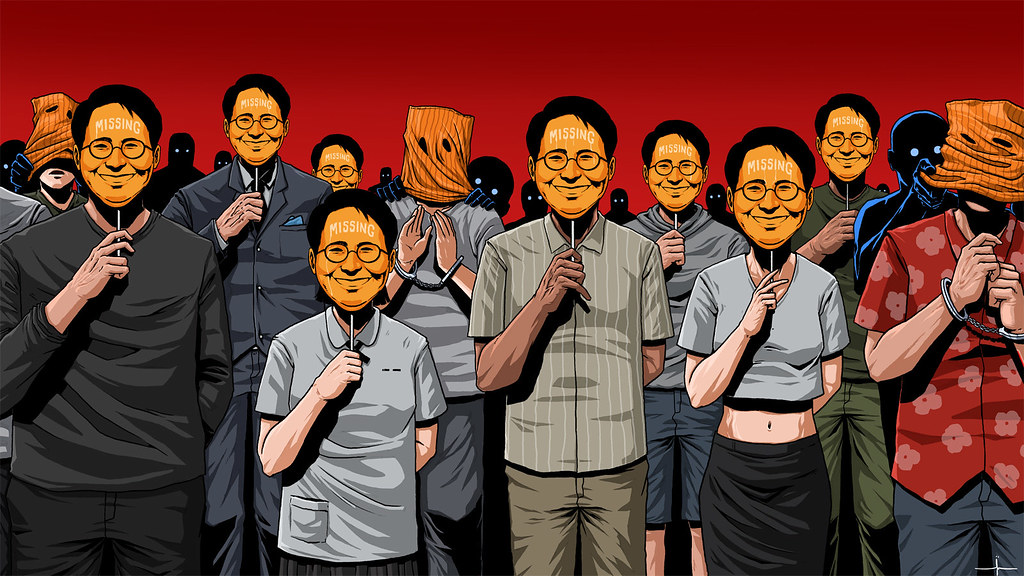
Read the article here.
In 2021, Prachatai English collaborated in our first cross-border investigative project with New Naratif and Voice of Democracy to find out what happened to Wanchalearm Satsaksit, a Thai activist-in-exile who went missing in June 2020 while living in Phnom Penh, Cambodia, and whose disappearance was one of the factors which sparked the pro-democracy movement in 2020.
While we did not find out what happened to him, our combined team of six reporters traced Wanchalearm’s life in Cambodia, his journey into exile, and his sister’s fight to learn his fate despite the lack of action from both the Thai and Cambodian authorities.
Kingkaew fire: a tragedy that will be repeated
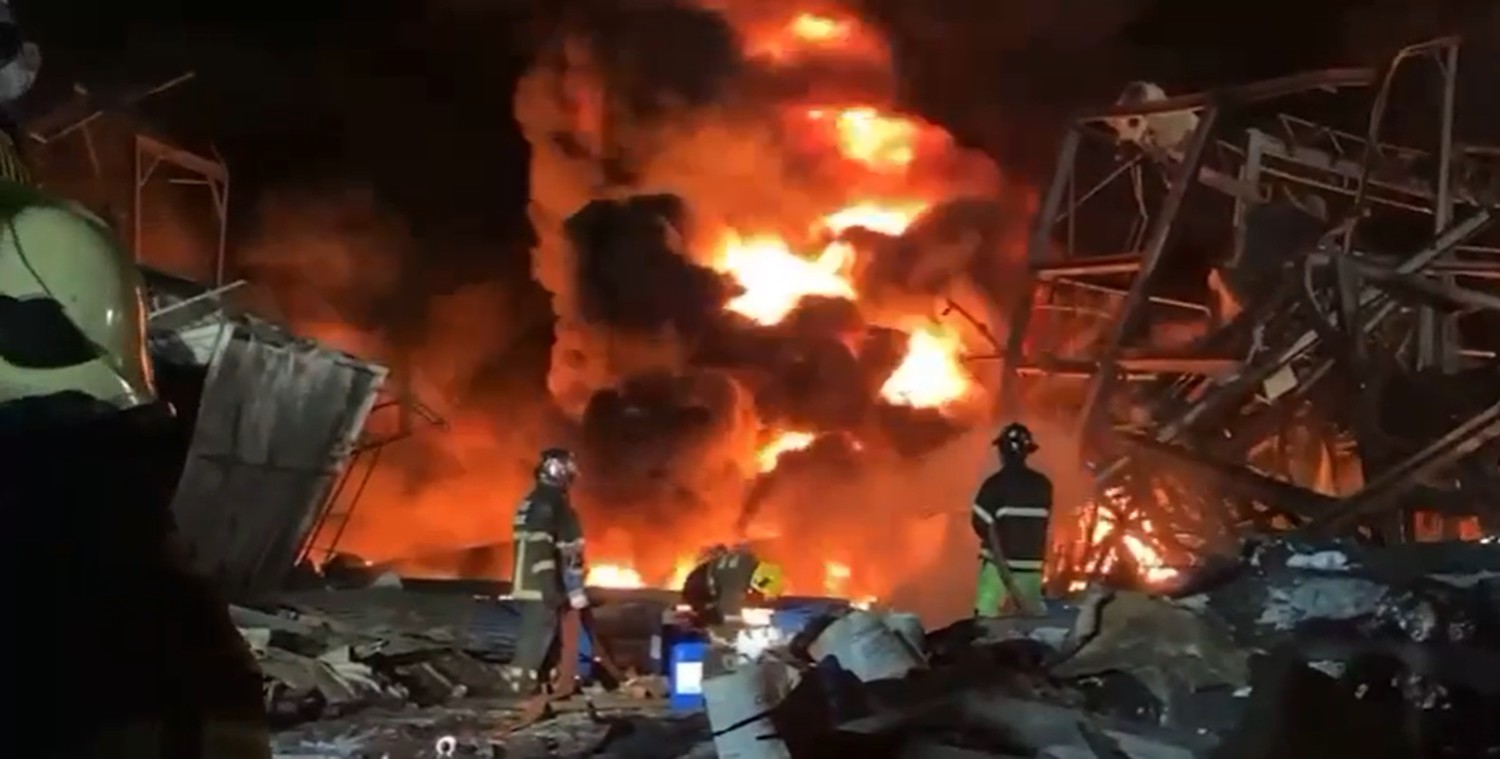
Read the article here.
In July, an explosion and fire broke out at the Kingkaew Factory, located in the middle of a populated area near Suvarnabhumi International Airport, resulting in the death of one firefighter, 40 people injured, damage to 70 houses, and over 80,000 people evacuated, and raising questions about the lack of vision and law enforcement in town planning and public safety.
Constitution Defence Monument, the historical monument that disappeared
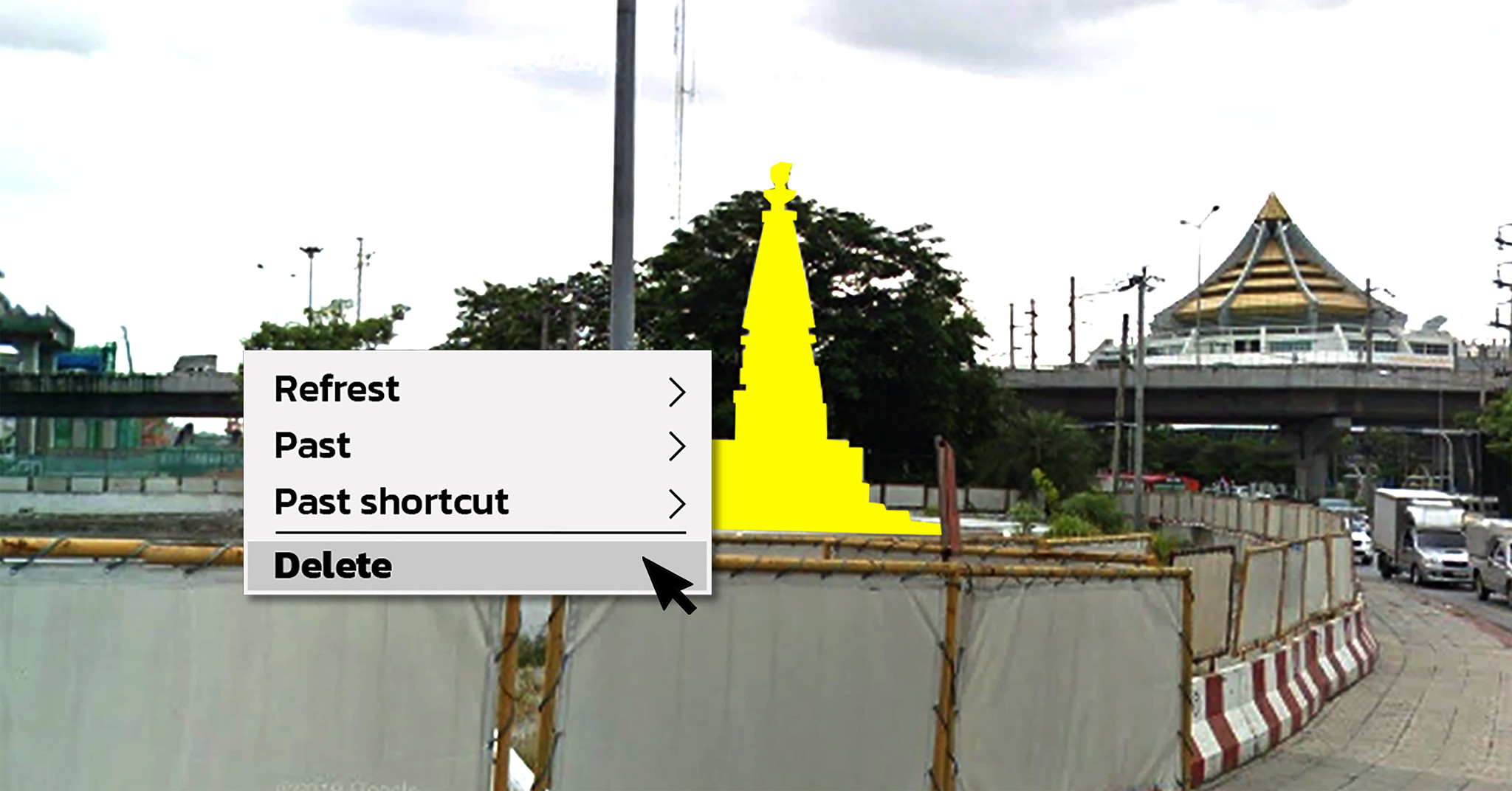
Read the article here.
In December 2018, the Constitutional Defence Monument, located near the Lak Si roundabout, disappeared without trace despite being 4 metres tall and situated in front of Bangkhen Police Station.
Jutharat Kuntankitcha investigated the monument’s disappearance. The Fine Arts Department said that no legal request for the monument to be moved was made in December 2018, and the Bangkok Metropolitan Administration (BMA) said it was not told about the relocation. To this day, there are still no answers.
2022 Budget: expenses related to the monarchy from all agencies total 35.7 billion baht

Read the article here.
For the third consecutive year, Prachatai looked through all budget documents after the 2022 Budget Expenditures bill passed to the committee stage to see how much budget is allocated for expenses relating to the monarchy.
For 2022, we found that government agencies have been allocated a total of 35.7 billion baht for expenses relating to the monarchy.
‘Nonviolence in my catapult’: protestors explain their use of force

Read the article here.
Almost every night from August to October 2021, the Din Daeng Intersection became a battlefield where protesters clashed with crowd-control police as they attempted to reach the residence of Gen Prayut Chan-o-cha located in the nearby 1st Infantry Regiment headquarters.
Protesters were seen shooting firecrackers and throwing home-made explosive devices and Molotov cocktails. The police responded with tear gas, rubber bullets, marbles and raids by police on motorcycles to arrest protesters.
Yiamyut Sutthichaya and Nontawat Numbenchapol spoke to the Din Daeng protesters, many of whom are young people from the nearby Din Daeng community who face ongoing economic hardship and inequality, about the reasons behind their clashes with the police.
Threats, violence, and lawsuits became 'normal' for Thai journalists
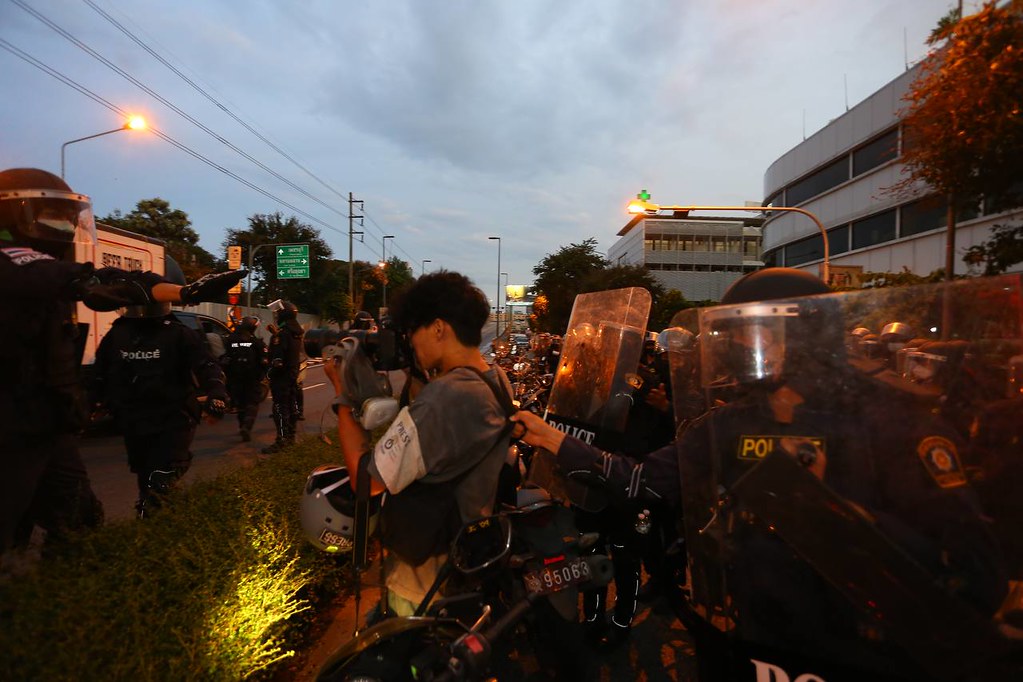
Read the article here.
During the 2020 – 2021 pro-democracy protests, field reporters have been arrested and injured despite wearing visible press IDs and staying in groups with other reporters. Crowd control police often attempt to block them from covering protests, especially during police operations, while citizen journalists become targets of arrests and violence. Reporters covering resource disputes, development projects, and labour rights continue to face lawsuits, and those working in the Deep South are at risk of harassment and arbitrary detention as their sources are threatened.
On the occasion of the International Day to End Impunity for Crimes against Journalists, Prachatai presented a report on the threats faced by journalists in Thailand and their impact on the journalists themselves and on the right to information.
Lives damaged as river fluctuates: reflections from the banks of the Mekong

Read the article here.
The Mekong River is a major element in the way of life of those living along its path. As dams placed upstream affect the water levels and the amount of sediment carried downstream, the impact of fishery, agriculture, and tourism is changing these people’s way of life.
Rattanaporn Khamenkit reported on the changes to the way of life of communities along the Mekong in Pho Sai District, Ubon Ratchathani Province, who are facing dead plants, disappearing fish, falling incomes, and diminished tourism – because of upstream dams in China.
Next steps on Thailand’s road to marriage equality
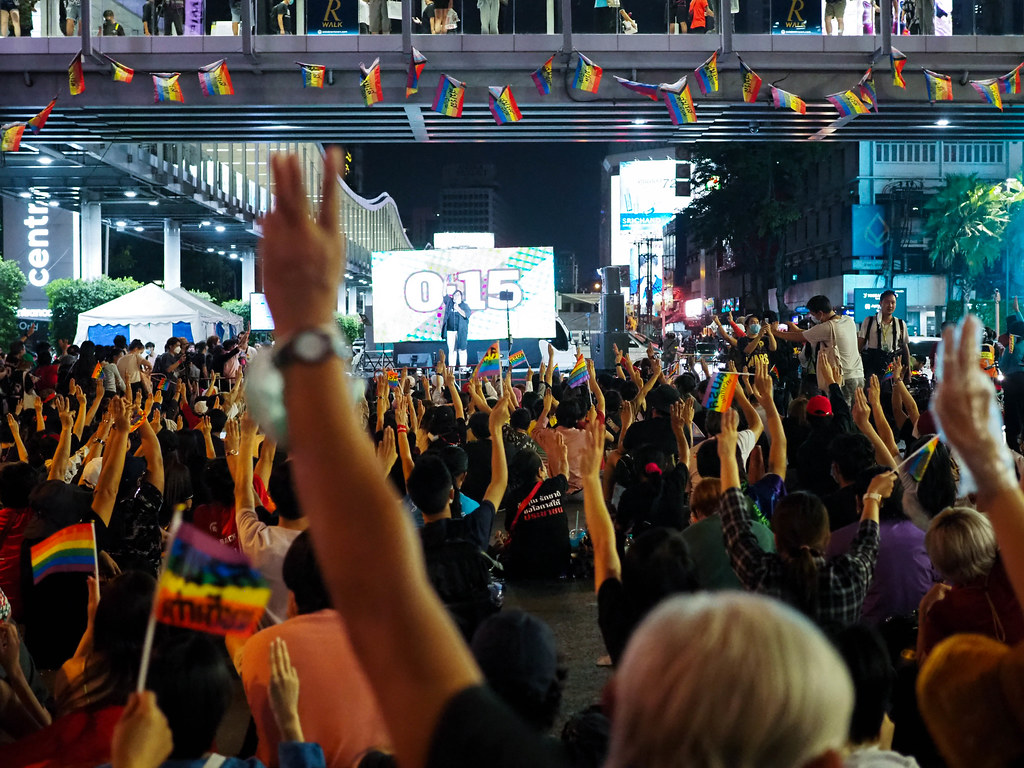
Read the article here.
On 7 November 2021, the Constitutional Court ruled that Article 1448 of the Civil and Commercial Code, which states that marriage can only be contracted between a man and a woman, does not violate the Constitution, sparking criticism from activists and members of the public, many of whom expressed their disappointment and anger at the Court’s decision and called for the law to be change so that everyone has equal rights, as well as calling out the homophobia still prevalent in Thai society despite its claim of being LGBTQ-friendly.
Anna Lawattanatrakul reported on where the movement for marriage equality is going after the ruling and amidst the pro-democracy protests, during which an unprecedented movement for gender equality emerged and young people called attention to LGBTQ right issues.
Struggling with mosquitoes (1): The past and present of dengue control in Thailand

Read the article here.
Dengue fever remains an ongoing problem in Thailand, as each rainy season leaves behind hundreds of thousands of patients. Each year, hundreds die of the disease. Now mosquitoes have developed improved resistance to control measures, creating a new challenge for public health officials.
Yiamyut Sutthichaya reported on the recurring dengue fever outbreaks in Thailand and health officials’ ongoing struggle to control the disease.
Struggling with mosquitoes (2): the future of dengue control

Read the article here.
Part 2 of the report on dengue fever control covered the effort to control the Aedes mosquito and dengue fever. In the past, control measures have produced uneven results, but as mosquitoes are becoming resistant to existing measures, researchers and health officials are reconsidering their plans and developing new measures in an effort to control the disease.
Prachatai English is an independent, non-profit news outlet committed to covering underreported issues in Thailand, especially about democratization and human rights, despite pressure from the authorities. Your support will ensure that we stay a professional media source and be able to meet the challenges and deliver in-depth reporting.
• Simple steps to support Prachatai English
1. Bank transfer to account “โครงการหนังสือพิมพ์อินเทอร์เน็ต ประชาไท” or “Prachatai Online Newspaper” 091-0-21689-4, Krungthai Bank
2. Or, Transfer money via Paypal, to e-mail address: [email protected], please leave a comment on the transaction as “For Prachatai English”
